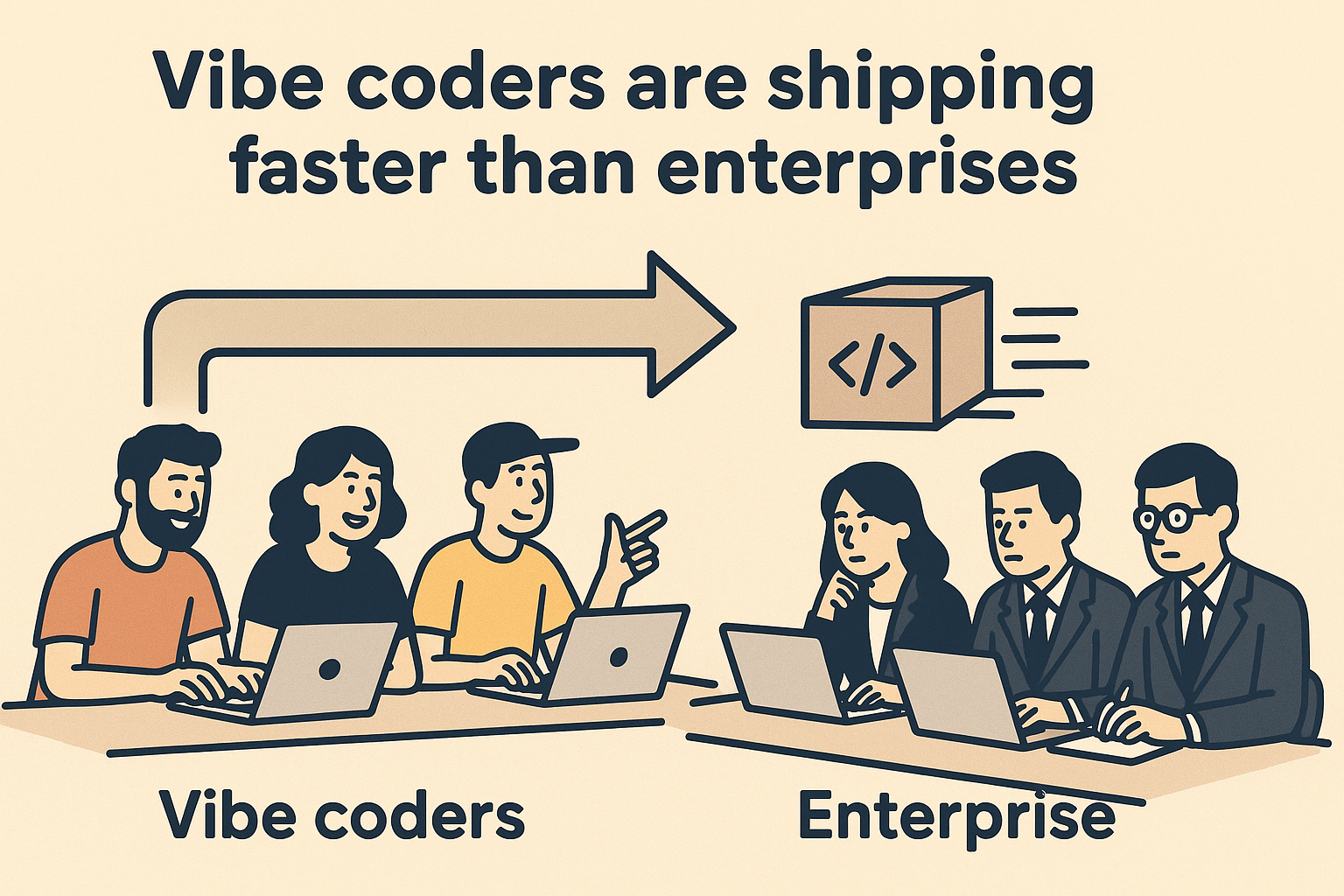Two Developers vs Your Entire Engineering Team
Posted on July 20, 2025 • 8 minutes • 1559 words
Why Vibe Coders Are Eating Enterprise’s Lunch
Hello friends! Hope everyone survived another round of enterprise “digital transformation” initiatives. While your company spent Q4 debating whether to approve Claude Code vs OpenAI for the development team, some kid with a laptop just built your entire product roadmap over the weekend.
Welcome to the era of vibe coders. Small teams using AI coding tools to move 3-10x faster than traditional enterprise development. We’re talking about teams hitting massive returns per employee while enterprises struggle to ship quarterly releases. And before you dismiss this as hype, consider that a quarter of Y Combinator’s current batch has codebases that are mostly AI-generated. Companies are hitting huge revenue numbers in 90 days with tiny teams. Individual developers are generating millions per year.
These aren’t flukes. They’re what happens when you eliminate the bureaucratic overhead that’s been strangling enterprise development forever.
The Tools Became Engineering Primitives
Here’s what changed: AI coding tools aren’t just getting better. They’ve become fundamental engineering primitives. Claude Code isn’t a fancy autocomplete anymore. It’s a sub-agent that understands your entire codebase, architectural patterns, and business logic. It operates at the level of systems thinking, not just syntax completion.
The magic happens when these agent based systems can spawn other sub-agents. Claude Code doesn’t just write your React component. It analyzes your existing patterns, understands your data flow, generates the component, writes the tests, updates the documentation, and suggests related refactors. Then it hands off to deployment agents that handle testing and rollback strategies.
This cascading intelligence means developers aren’t just writing code faster. They’re operating at a higher level of abstraction entirely. Instead of implementing authentication, you’re designing user experiences. Instead of debugging database queries, you’re architecting data flows and threat modeling your system. The cognitive load that used to require specialist knowledge across domains now gets handled by coordinated AI agents.
Meanwhile, your enterprise team is still waiting for the Architecture Review Board to approve their React upgrade.
Enterprise: Where Code Goes to Die
Let’s talk about what happens in enterprise development. Most people are very familiar with the traditional enterprise development scenario: your team wants to add a new dependency? That’s a 1-2 week security review, assuming the Architecture Review Board doesn’t kill it first. Want to use a new AI tool? Hope you enjoy 6-12 months of vendor evaluation and compliance theater.
The numbers are brutal. Nearly half of enterprise product launches get delayed by at least a month. SOC 2 compliance alone eats 2-6 months for first-timers, with ongoing development time constantly consumed by compliance monitoring. A simple security review takes weeks, and that’s before penetration testing adds another month.
While you’re waiting for the Change Control Board’s bi-weekly meeting to approve your button color change, vibe coders are shipping dozens of times per day. They deploy to Vercel in 30 seconds, fix bugs in minutes, and iterate based on actual user feedback instead of stakeholder PowerPoints.
The technology stack freedom alone is massive. Enterprises lock developers into “approved” languages and frameworks decided in 2019. Small teams pick whatever solves the problem today. React, Vue, Svelte, whatever. They experiment with new AI models the day they’re released while enterprises are still evaluating GitHub Copilot.
The Displacement is Already Happening
This isn’t theoretical. Small AI-powered teams are actively eating traditional enterprise software’s lunch, and the examples are everywhere if you know where to look.
Solo developers are hitting seven-figure revenues with AI-assisted tools. Tiny teams are building enterprise software replacements that would have required 50+ person engineering orgs just two years ago. The indie hacker community is full of people quietly generating massive returns. Accounting platforms like Vic.ai achieving 85% no-touch invoice processing, competing directly with established players. Developer tools, SEO platforms, and business automation software built by individuals that enterprises are switching to.
The pattern is always the same: identify inefficient enterprise software, build a streamlined AI-native alternative, capture market share with better UX and dramatically lower prices. Categories traditionally dominated by Salesforce, Microsoft, and Oracle are getting picked apart by people working from their laptops.
What’s telling is how many of these success stories you don’t hear about. For every visible example making headlines with their multi-million dollar solo ventures, there are dozens more flying under the radar, building sustainable businesses that generate more revenue per employee than most traditional software companies.
Y Combinator’s current batch is showing unprecedented growth rates, but they’re just the visible tip of the iceberg. The real disruption is happening in communities where skilled developers who would have built everything from scratch a year ago now leverage AI for the majority of their codebase. And they’re winning.
The Two Pizza Rule Wins Again
I remember when I first heard about Amazon’s Two Pizza Rule and thought “that can’t be right, can it?” If you need more than two pizzas to feed your team, it’s too big. Seemed arbitrary.
Fast forward to a more experienced me: yep, it’s dead on.
Small teams don’t just move faster because they’re small. They move faster because coordination overhead grows exponentially with team size. While large teams spend half their time in meetings explaining what they’re building to each other, small teams just build it.
AI amplifies this advantage even more. The productivity gap between good and mediocre developers was already 10:1. With AI tools, skilled developers can multiply their capabilities while coordination overhead stays exactly the same. A two-person team with Claude Code can outship a 20-person enterprise team, and it’s not even close.
Why This Actually Works
Here’s what’s really happening: AI coding agents eliminate the traditional bottlenecks that require specialists. Database design that took days now happens in minutes. UI implementation goes straight from Figma to production code. Testing used to consume 30-50% of development time. Now it becomes automatic with AI generating comprehensive test suites.
Infrastructure basically disappears as a concern. Developers deploy complex applications in 30 seconds. Platforms provide automatic CI/CD and global CDN distribution. The entire DevOps function, which usually requires multiple engineers just get dusted like they got hit with the Snap.
The velocity gains compound across every aspect of development. While traditional developers produce dozens of lines of working code per hour, AI-assisted developers hit hundreds or even thousands of lines. Feature development timelines compress from weeks to days. Bug resolution that took hours now completes in minutes with automatic root cause analysis.
When everything from prototyping through deployment and monitoring leverages AI assistance, teams build in days what previously took months. Features ship in hours instead of weeks. Applications maintain themselves with a fraction of traditional effort.
Claude Code Changed Everything
Here’s what’s interesting: Claude Code didn’t just launch another AI coding tool. It shifted how everyone else thinks about what these tools should be. Before Claude Code, most AI coding assistants were glorified autocomplete with extra steps to hit completion endpoints. Now suddenly everyone’s scrambling to build actual development agents.
GitHub Copilot went from code suggestions to full workspace integration. Cursor started pushing harder on autonomous coding sessions. Even smaller or new players pivoted their entire roadmaps toward agentic capabilities. The whole industry realized they were playing the wrong game.
Claude Code proved that developers don’t want faster typing. They want thinking partners that understand systems, not just syntax. Tools that can reason about architecture, not just complete functions. Agents that can operate across entire codebases and development workflows, not just the current file.
The competitive response has been swift. Every AI coding company is now racing to build sub-agents, multi-step reasoning, and deeper contextual understanding. The bar for what counts as an “AI coding tool” got raised overnight, and a lot of existing solutions suddenly looked pretty basic.
This is just the warm-up. As these tools get more capable at actual software engineering (not just code generation), the gap between vibe coders and traditional enterprise teams is going to widen into a chasm.
What This Really Means
Here’s the deal: enterprise development is broken, and AI just made it obvious.
Those months your company spends on security reviews and architecture committees? They’re not protecting you. They’re killing you. While you’re debating governance frameworks, some developer with Claude Code is shipping your entire roadmap and stealing your customers.
The uncomfortable truth is that most enterprise “best practices” are just institutional anxiety dressed up as process. Security theater that makes managers feel important while actual threats walk right through the front door. Compliance requirements that exist to justify compliance teams, not to actually secure anything.
Small teams using AI tools aren’t just faster. They’re operating in a completely different reality. They build, ship, learn, and iterate while enterprises are still forming committees to discuss forming committees.
This isn’t about technology adoption. It’s about fundamental organizational design. Companies that can’t adapt to AI-native development won’t slowly decline. They’ll get blindsided by competitors they never saw coming.
The future belongs to teams that embrace rapid iteration and absurd simplification. Everyone else gets to explain to their board why a two-person startup just ate their market share.
Hot take: Within 18 months, most traditional enterprise development teams will be extinct. Not downsized, not reorganized, just extinct. The ones that survive will look nothing like today’s bloated, committee-driven disasters. You can either join the vibe coders or watch them dismantle your industry from the outside. There’s no middle ground!

